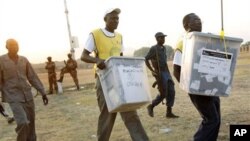The government of South Sudan has approved a $517-million budget for general elections, which are due to be held in July next year, but a leading opposition figure says holding the vote would be unconstitutional and called for it to be delayed.
South Sudan Information Minister Michael Makuei Lueth said the Council of Ministers at a meeting on Wednesday "... approved an amount of 1.5 billion South Sudanese Pounds for running the elections.”
Makuei said South Sudan's transitional constitution stipulates that elections must be held in 2015.
According to the constitution, the term of the president "shall be four years, commencing from July 9, 2011." It also says when the presidential term expires, the office of the president will be considered vacant and the position will be temporarily handed to the vice president, "pending the filling of this position within 14 days."
President Salva Kiir was elected president of what was then Southern Sudan in April 2010. Mr. Kiir's first day in office as president of South Sudan was on July 9, 2011 -- the day the country became an independent nation.
South Sudan has been engulfed since December last year in a conflict that pits the army, which is loyal to Mr. Kiir, against forces loyal to former vice president Riek Machar.
Opposition leader: postpone the vote
Opposition leader Lam Akol said that, if South Sudan's laws are followed to the letter, the vote should be postponed.
“According to the election law, political parties must be registered in accordance with the elections act of 2012. None has registered, including the ruling party itself," Akol told South Sudan in Focus.
"So are you going to carry out elections in violation of the constitution and in violation of the law? The government did not swear in the body that regulates the different political parties. It is called the Political Affairs Council. It did not swear them in for two years,” Akol said.
The transitional constitution of South Sudan also calls for a census to be held ahead of the next general elections, to "determine the number of electoral constituencies for" those elections. Because of the ongoing conflict, that has not happened.
It also calls for a National Elections Commission to be set up to organize the vote. South Sudan has an electoral commission, but it is severely under-funded.
Akol said the money approved for the elections should be used to help the hundreds of thousands of South Sudanese who, because of the ongoing conflict, are in need of food and shelter.
"I think the government should have paid that money for those people because that is the priority -- to save lives, not to talk about diversionary issues," he said.
He said holding elections next year, after the country has been mired in conflict for the past 12 months, was unrealistic.
"In the first place, elections should be held when there is peace. You cannot have elections when people are still fighting. And people are displaced -- about two million people have been displaced,” he said.
In May, Mr. Kiir said there would be no general election "... in 2015 because reconciliation between the people will have to take time." He said South Sudan would have an interim government during the reconciliation process.
A month later, Mr. Kiir insisted that there would only be a transitional government if he were its leader.
Days before the government approved the budget for the elections, the activist group South Sudan Network for Democracy and Elections called for the vote to be postponed. The group said insecurity in many parts of the country would stand in the way of free and fair elections.
Makuei said the elections will only be held as scheduled in July if a peace agreement has been reached by then with the rebels. The latest round of peace talks between the government and rebels broke down last week.
John Tanza and Karin Zeitvogel contributed to this report.




